Struggling to pick the right tote bag material? The options seem endless, and a wrong choice costs time and money. Let’s simplify things for you.
The best tote bag material really depends on your specific needs! Key options for 2025 include versatile Cotton, durable Canvas, modern Tyvek, waterproof Washed Kraft, eco-friendly rPET and Jute, and budget-friendly Non-Woven PP. Each offers unique pros and cons for specific uses.
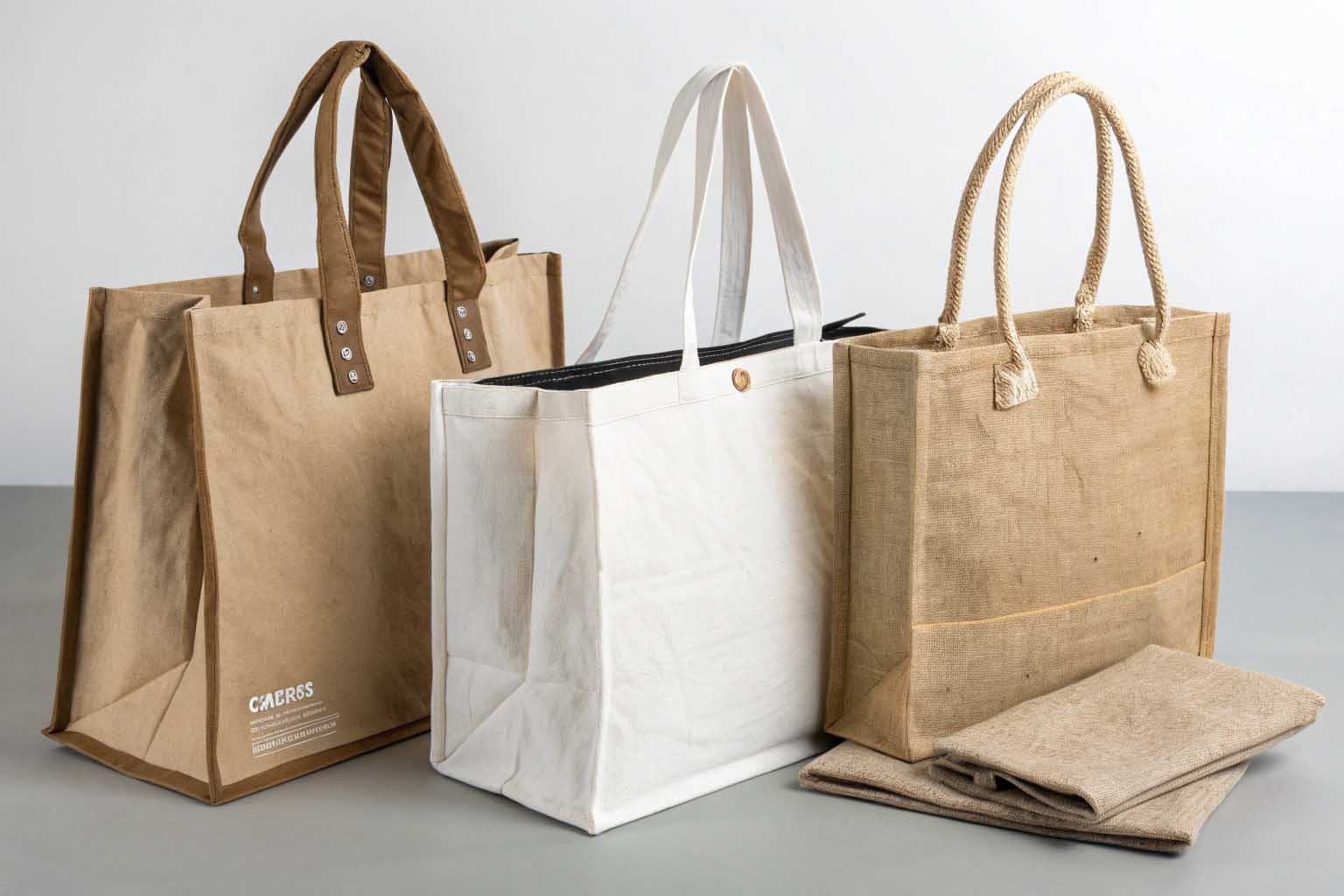
Choosing the perfect tote bag material can feel overwhelming. There are so many factors like durability, cost, eco-friendliness, and style. Let’s break down each popular option so you can confidently decide which material truly fits your brand and purpose. Ready to dive in?
Cotton Tote Bags: Lightweight and Affordable
Need a soft, budget-friendly bag option? Worried about print quality or breathability? Cotton totes could be the simple solution you’re looking for.
Yes, cotton tote bags are known for being lightweight and generally affordable. They offer a soft feel, good printability, and breathability, making them great for promotions, groceries, or simple everyday carry, especially organic cotton for eco-conscious choices.
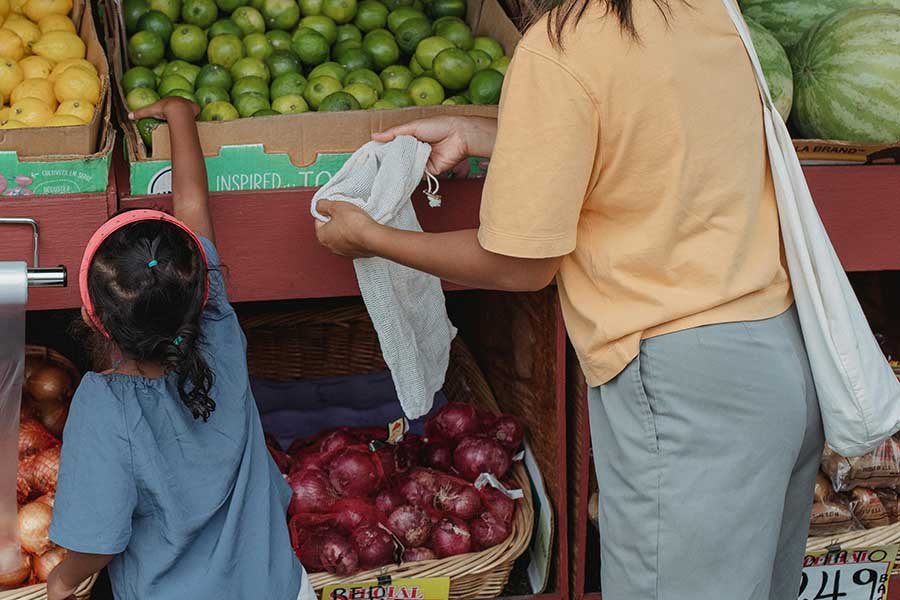
Diving Deeper into Cotton Totes
Cotton is a really popular choice, and for good reason. It’s versatile and feels familiar to most people. Let’s look closer:
-
Material Types: You’ll find bags made from 100% pure cotton, blends (like cotton-polyester for added strength), and increasingly, organic cotton. Organic options are grown without synthetic pesticides or fertilizers, making them a better choice for the planet.
-
Key Features:
- Soft & Lightweight: Easy to fold and carry.
- Breathable: This is a big plus! It helps prevent mold and smells, making cotton bags great for carrying produce or baked goods like bread. I’ve seen clients specifically request them as bread bags,vegetable and fruit bags. Cotton can also absorb a lot of moisture.
- Print-Friendly: Cotton takes inks and embroidery really well. This makes it ideal for custom branding and promotional items. Logos often look sharp and vibrant.
- Eco-Credentials: Cotton is a natural, renewable resource. It’s biodegradable, especially organic cotton.
- Washable: Most cotton totes can be machine washed, which is great for keeping them clean after grocery runs.
-
Things to Consider: Standard cotton can shrink when washed. It’s also not naturally water-resistant. While affordable, organic cotton usually costs a bit more.
In my experience, cotton is a go-to for promotional giveaways, simple shopping bags, and applications where breathability is key.
| Pros | Contras |
|---|---|
| Soft & Comfortable | Can shrink when washed |
| Breathable (Good for food) | Not naturally water-resistant |
| Excellent Print Surface | Standard cotton uses resources |
| Biodegradable (esp. Organic) | Organic option costs more |
| Relatively Affordable | Less durable than canvas for heavy loads |
Canvas Tote Bags: Durable and Classic
Searching for a sturdy, timeless bag that lasts? Concerned about wear and tear with heavier items? Canvas totes are a classic choice known for their strength.
Absolutely, canvas tote bags are prized for their durability and classic look. Made from tightly woven cotton or linen, they handle heavier loads well and have a timeless style. They’re a reliable choice for frequent use and carrying substantial items.
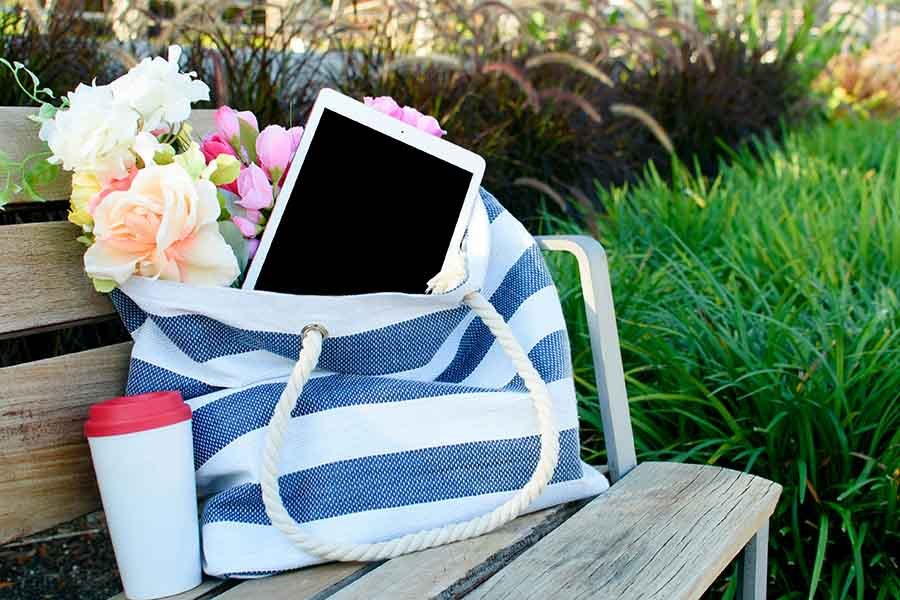
Diving Deeper into Canvas Totes
Canvas is a true workhorse in the tote bag world. I see it requested constantly, and it never seems to go out of style.
-
What Makes it Strong?: Canvas is typically made from cotton or linen, but the key is the plain weave. This weave makes the fabric incredibly sturdy and resistant to tearing compared to standard cotton bags. It can handle heavier groceries, books, or daily essentials without worry.
-
Why It’s a Classic:
- Timeless Look: Canvas has a simple, natural aesthetic that works with almost anything. It’s not overly trendy, so it lasts season after season.
- Versatility: It comes in various weights (measured in ounces), colors, and styles. From basic shoppers to more structured bags with pockets,zippers,liners,etc, there’s a canvas option for nearly every need.
- Great for Customization: Like cotton, canvas is excellent for printing, embroidery, or even painting For DIY occassions. It provides a sturdy surface for detailed logos or designs, making it popular for brands and events.
-
Points to Keep in Mind:
- Water Absorption: Untreated canvas will soak up water, so it’s not ideal for rainy conditions unless treated or Waxed.
- Cleaning: It can sometimes be tougher to clean than basic cotton, especially if stained. Check washing instructions.
- Peso: Heavier canvas adds to the bag’s overall weight.
Canvas is perfect when durability is a priority. Think library bags, sturdy grocery shoppers, everyday carry-alls, and high-quality promotional items meant to last.
| Pros | Contras |
|---|---|
| Highly Durable & Strong | Absorbs water (unless treated) |
| Classic, Timeless Aesthetic | Can be heavier than other options |
| Excellent for Customization | Can be difficult to clean stains |
| Versatile Styles & Weights | Potentially higher cost than basic cotton |
| Widely Available | Bulkier than foldable options |
Tyvek Tote Bags: Modern and Waterproof?
Want a bag that’s waterproof, super light, and looks unique? Worried about tears or just want something different? Tyvek offers a modern, high-tech alternative.
Yes, Tyvek tote bags stand out for being modern, waterproof, and tear-resistant. This unique material is incredibly lightweight yet strong, often featuring a paper-like or even leather-like texture. It’s great for a contemporary, functional, and eye-catching bag.
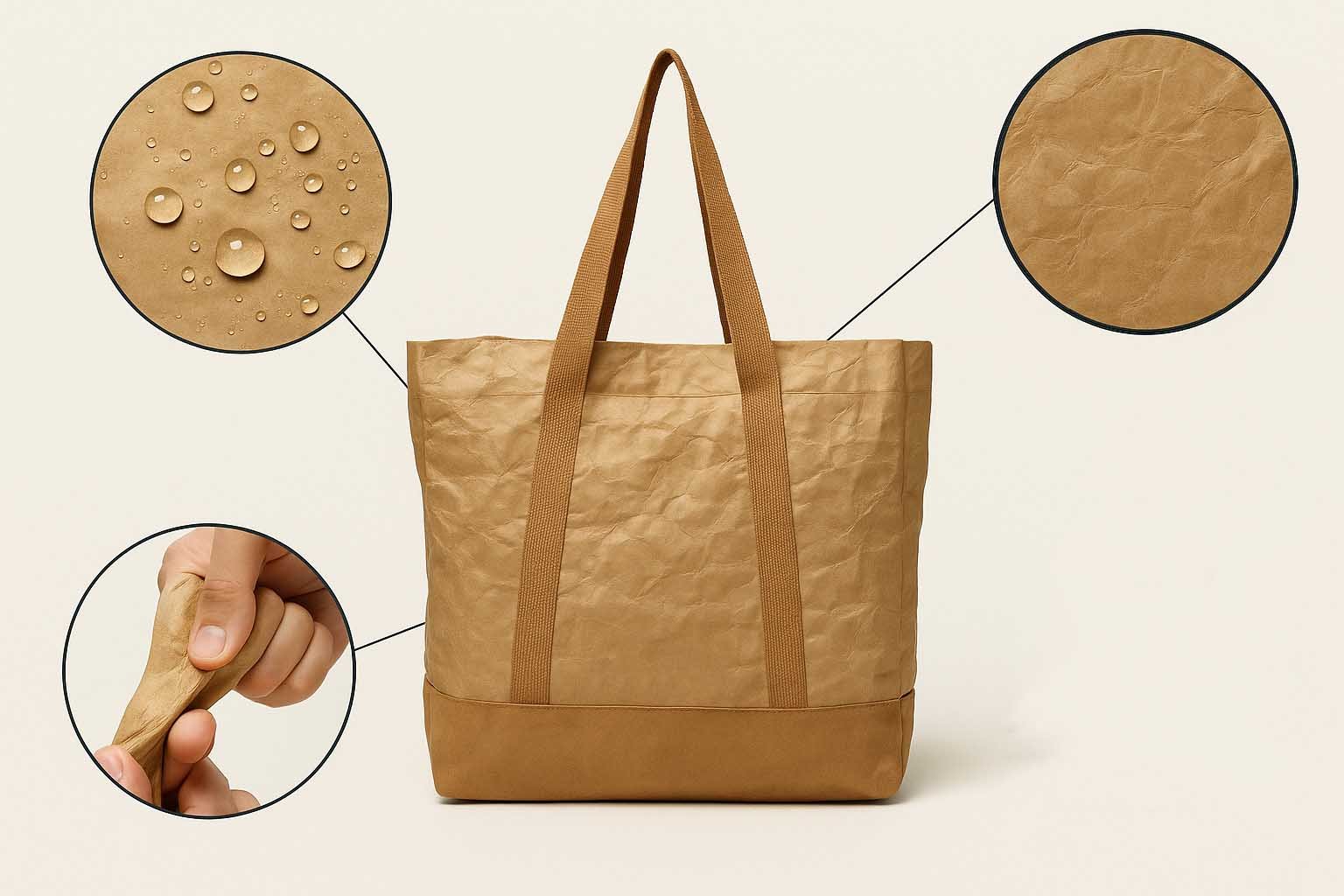
Diving Deeper into Tyvek Totes
I’ve definitely seen a surge in interest for Tyvek Tote bags lately. They have a unique appeal that blends eco-friendliness with a modern, almost industrial vibe.
-
Unique Material Properties: Tyvek is made from high-density polyethylene fibers. It’s not paper and it’s not fabric, but something in between.
- Waterproof & Tear-Resistant: This is a major selling point. It offers great protection against spills and snags.
- Ultra-Lightweight: It’s surprisingly light for how strong it is.Despite its lightness, the bag can be combined with other materials, such as inner cotton lining or aluminum foil, to add insulation.
- Breathable (to water vapor): While it resists liquid water, it allows water vapor to pass through.
- Chemical & UV Resistant: Holds up well against various chemicals and sun exposure.
-
The Look and Feel:
- Texture: Tyvek often has a crinkled, paper-like texture that many find appealing. Some treatments can even give it a soft, leather-like finish.
- Color: While the natural ‘kraft-paper’ tone is most popular (it really highlights the eco-look), it can be produced in various colors. But based on orders I handle, most clients stick with the original shade.
- Personalización: It can be printed on, offering good branding opportunities.
-
Eco-Angle: Tyvek is recyclable (though specific recycling streams are needed). It offers a durable alternative to single-use bags. Its lightweight nature also means lower shipping emissions. It hits a sweet spot: sustainable, high-quality feel, but more affordable than leather.
Tyvek is great for brands wanting a modern, durable, waterproof bag with a distinct look. It’s good for tech companies, contemporary retailers, or events wanting something memorable.
| Pros | Contras |
|---|---|
| Waterproof & Tear-Resistant | Can be noisy (crinkly sound) |
| Extremely Lightweight | Requires specific recycling channels |
| Unique Modern Aesthetic | Can develop permanent creases |
| Printable for Branding | Higher cost than non-woven or basic cotton |
| Chemical & UV Resistant | Texture might not appeal to everyone |
| Durable Alternative |
Washed Kraft Tote Bags: Waterproof and Durable
Looking for a durable, washable material with a rustic paper look? Need something water-resistant but unique? Washed kraft paper Tote Bag offers surprising resilience and style.
Washed kraft paper tote bags offer good durability and water resistance, surprisingly so for a paper-like material. They are washable, vegan, and have a distinct, often rugged aesthetic, making them a unique and functional choice for structured bags.
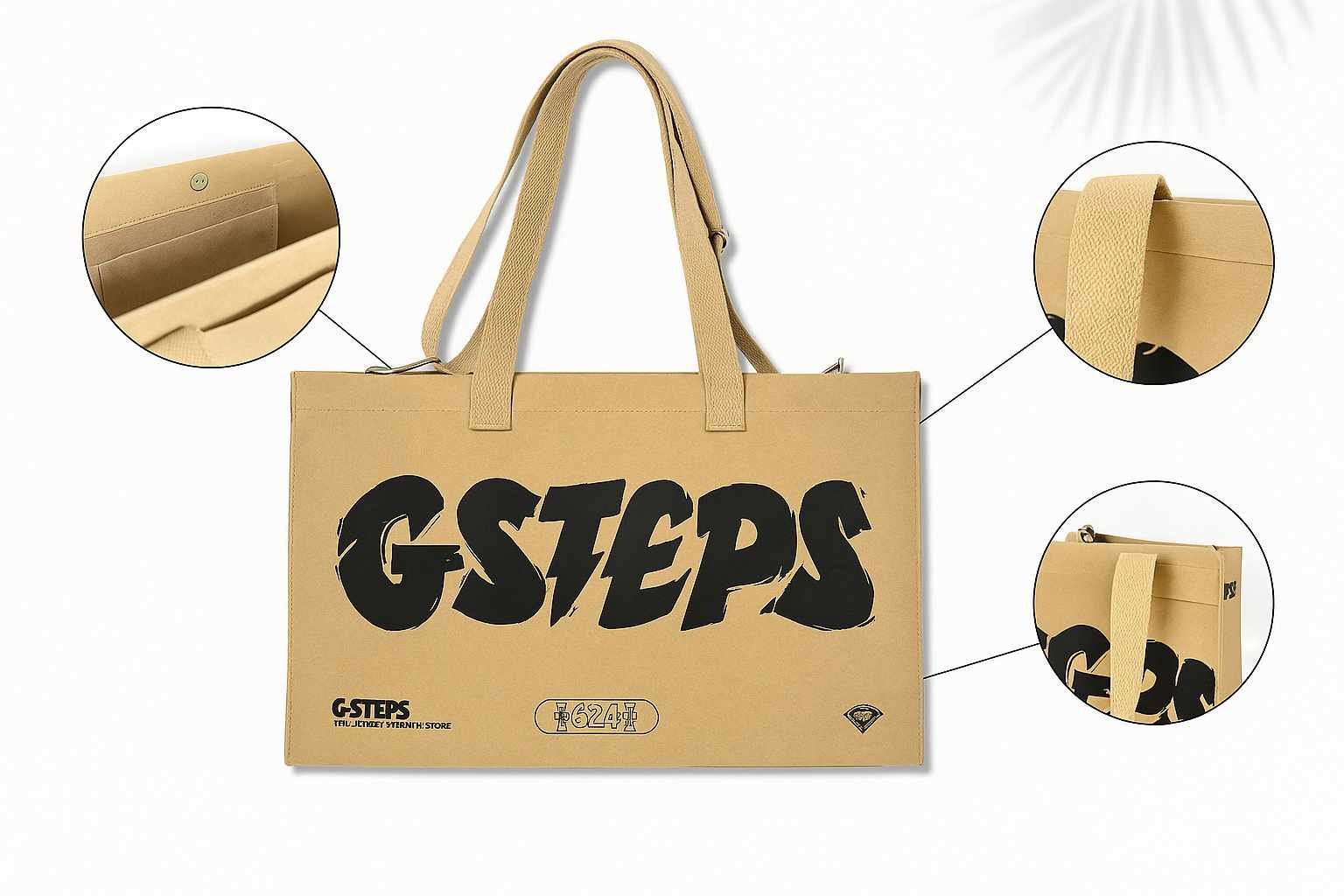
Diving Deeper into Washed Kraft Paper Totes
This material often surprises people! It looks like sturdy paper but acts more like fabric or leather in some ways.
-
What Is It?: It’s essentially a specialty paper treated to be durable and washable. At first glance, I sometimes mistake it for Tyvek or thick traditional kraft paper due to its texture. It’s typically quite rigid.
-
Key Advantages:
- Washable: This is the standout feature. Unlike regular paper, it can handle getting wet and being cleaned.
- Durable: It holds up well to use and resists tearing better than you might expect.
- Water-Resistant: It won’t disintegrate in the rain like standard paper bags.
- Vegan & Cruelty-Free: A great alternative to leather for those seeking animal-free products.
- Aesthetic: It has a unique, tactile, often rustic look that gains character with use.
-
Common Uses: Because it’s quite stiff, washed kraft paper works really well for structured totes – bags that stand up on their own, often with reinforced bases or side panels. I also see it used a lot for stylish plant pot covers and home storage bins.
This material is a fantastic choice if you want a bag with a natural paper look but need more durability and water resistance. It’s great for structured bags, retail packaging that feels premium, or unique promotional items.
| Pros | Contras |
|---|---|
| Washable & Water-Resistant | Can be stiff/rigid |
| Durable Paper-Like Material | May show wear/creases over time |
| Unique Rustic/Vintage Aesthetic | Limited color options typically |
| Vegan Leather Alternative | Can be more expensive than standard paper |
| Good for Structured Designs | Printability might be limited |
Recycled PET (rPET) Tote Bags: Recycled and Trendy
Need a durable bag made from recycled materials? rPET totes are a trendy, eco-conscious choice using plastic bottles.
Yes, rPET tote bags are made from recycled plastic bottles, making them a trendy and visibly sustainable option. They look like regular polyester but carry a strong environmental message, appealing to eco-conscious brands and consumers despite often higher costs.
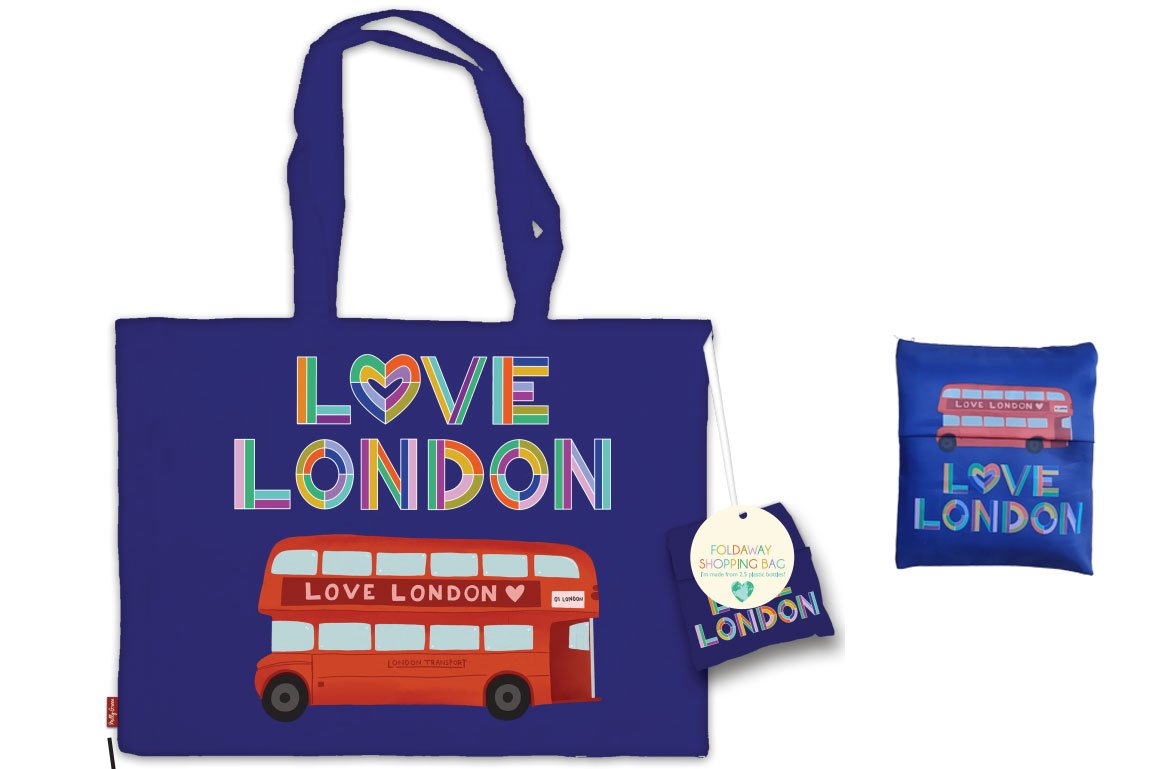
Diving Deeper into rPET Totes
Over the last three years, I’ve personally seen a big jump in custom orders for rPET bags ,especially from clients in Europe and North America who have strong sustainability goals.
-
The Eco-Friendly Choice:
- Source Material: rPET stands for Recycled Polyethylene Terephthalate. It’s made by collecting, cleaning, and melting down post-consumer plastic bottles (like water or soda bottles) and spinning the material into fibers.
- Benefits: This process uses less energy and fewer resources than making virgin polyester. It also diverts plastic waste from landfills and oceans.
-
Material Characteristics:
- Look & Feel: Visually, rPET fabric is often indistinguishable from virgin polyester. It’s smooth, durable, and can be easily printed on.
- Durability & Strength: Similar to polyester, it’s strong, resistant to stretching and shrinking, and quick-drying.
- Cleanability: Easy to wipe clean or wash.
-
Market Insights & Considerations:
- Cost: It’s important to know that rPET is substantially more expensive than virgin polyester due to the collection and recycling process.
- Traceability: Reputable suppliers offer a traceable supply chain, meeting strict standards, which is crucial for brands promoting sustainability.
- Client Profile: This material appeals most to brands with dedicated sustainability commitments and budgets to match.
- Common Specs: Many requests I see are for foldable, single-layer, lightweight bags (e.g., 34X45X5CM,folding 11X11.5CM). The unit price often hovers around $1.30, which is higher than many alternatives.
rPET is ideal for companies prioritizing and communicating environmental responsibility. It’s a great choice if the budget allows and the sustainable story is key to your brand message.
| Pros | Contras |
|---|---|
| Uses Recycled Materials (Bottles) | Significantly Higher Cost than Virgin Poly |
| Reduces Landfill Waste | Energy is still required for recycling |
| Durable & Strong like Polyester | Quality can vary depending on source |
| Good Printability & Customization | Requires consumer recycling participation |
| Strong Eco-Marketing Message | Not biodegradable |
Jute Tote Bags: Rustic and Sustainable?
Seeking a bag with a natural, earthy feel? Want a strong, biodegradable, and sustainable option? Jute totes offer a rustic charm combined with eco-credentials.
Definitely. Jute tote bags are known for their rustic appearance and strong sustainability profile. Made from natural plant fibers, they are biodegradable, durable, and breathable, making them an excellent eco-friendly choice for a natural, textured look.
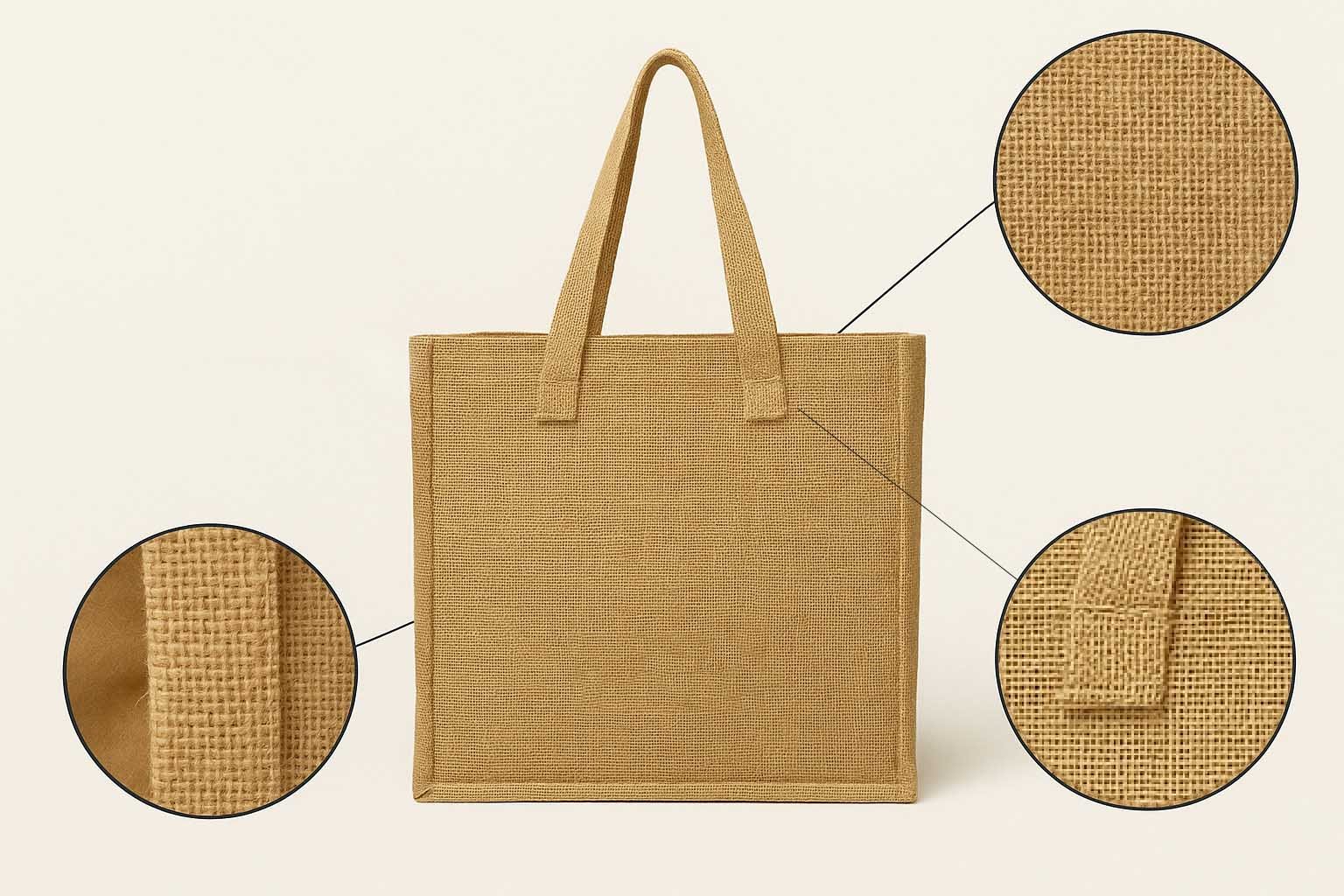
![]()
Diving Deeper into Jute Totes
Jute has this wonderful, natural vibe that many brands love, especially those wanting to project an organic or earthy image.
-
Natural and Biodegradable: Jute is a vegetable fiber, primarily grown in India and Bangladesh. It grows quickly with minimal need for fertilizers or pesticides, making it very sustainable. Plus, it’s completely biodegradable and compostable at the end of its life.
-
Key Features:
- Rustic Look: Jute has a coarse, natural texture often described as "burlap-like." This gives it a distinct, earthy appeal.
- Strength: Jute fibers are surprisingly strong, making these bags durable enough for carrying groceries or heavier items.
- Transpirabilidad: Like cotton, jute allows air to circulate, which can be good for carrying certain types of produce.
- Cost-Effective: Often, jute bags can be quite affordable, especially for simpler designs.
- Reusable: They are designed for multiple uses, replacing single-use plastic bags.
-
Things to Note:
- Texture: The coarse texture isn’t always ideal for very fine print details, though bold logos work well.
- Water: Jute can absorb water and may weaken or stain if heavily soaked. Some jute bags come with a laminated lining for water resistance.
- Shedding: Sometimes, new jute bags might shed small fibers initially.
Jute is perfect for farmers’ markets, grocery stores, eco-conscious brands, garden centers, or anyone wanting a sturdy, natural-looking, and highly sustainable bag option.
| Pros | Contras |
|---|---|
| Highly Sustainable Resource | Coarse Texture limits fine print detail |
| Biodegradable & Compostable | Absorbs water (unless lined) |
| Strong & Durable Fibers | Can shed fibers initially |
| Natural, Rustic Aesthetic | May have a distinct natural odor |
| Often Cost-Effective | Less smooth feel than cotton or polyester |
| Breathable |
Non-Woven Polypropylene (PP): Cost-Effective and Reusable
Need a very budget-friendly bag for promotions or packaging? Looking for something lightweight and easily customizable? Non-woven PP bags are a common, low-cost solution.
Yes, non-woven polypropylene (PP) bags are extremely cost-effective and lightweight. While considered semi-reusable rather than highly durable, they are great for large quantities, promotions, basic packaging, and easily accept printing for branding.
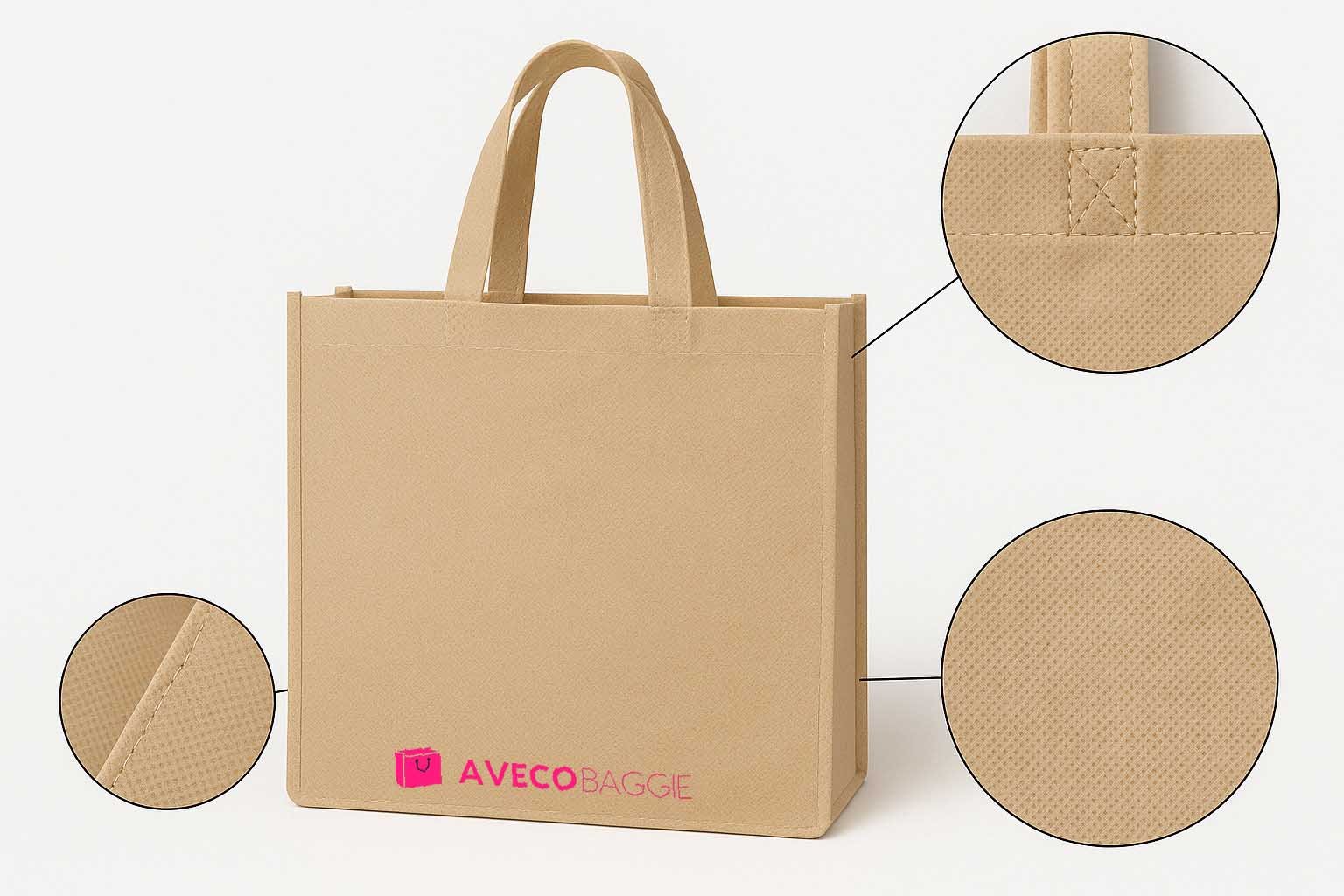
Diving Deeper into Non-Woven PP Totes
You see these bags everywhere, and their low cost is a major reason why. They are incredibly versatile for specific applications.
-
What Is It?: Non-woven PP is made by bonding or interlocking polypropylene fibers using heat, chemicals, or mechanical means, rather than weaving them like traditional fabric. This process is fast and inexpensive.
-
The Budget-Friendly Option: This is usually the lowest-cost reusable bag material available, making it ideal for mass giveaways, trade shows, or basic retail checkout bags where budget is the primary concern.
-
Key Characteristics:
- Lightweight: Very easy to carry and store.
- Water-Resistant: Offers some protection against moisture.
- Easy to Print On: Takes logos and branding well using screen printing or heat transfer.
- Versatile Uses: Beyond simple totes, I see it used heavily for product packaging dust bags (especially for luggage or shoes) and insulated food delivery bags. In places like China with a huge food delivery market, adding an aluminum foil lining turns these into effective thermal bags for takeout.
-
Durability Considerations: It’s important to understand that non-woven PP is best described as "semi-reusable." It’s stronger than a single-use plastic bag but less durable than canvas, jute, or cotton. It can tear or puncture more easily, and seams might give way under heavy load over time. While technically washable, repeated washing can degrade the material.
Non-woven PP is the go-to choice when cost is the main driver. Perfect for large-scale promotions, simple packaging needs, event goodie bags, or insulated bags for food service if durability isn’t the top priority.
| Pros | Contras |
|---|---|
| Extremely Low Cost | Least Durable Reusable Option |
| Lightweight & Easy to Store | Can tear or puncture easily |
| Water-Resistant | Degrades with washing/heavy use |
| Good for Printing/Branding | Not biodegradable (plastic-based) |
| Versatile for Packaging/Liners | Less premium feel than other materials |
Conclusión
Choosing the best tote material hinges on your specific needs – budget, use case, desired look, and eco-priorities. While Canvas remains incredibly popular and versatile, my personal recommendation often leans towards Tyvek for its unique blend of modern style, waterproof durability, and lightweight feel.
Avecobaggie offers customizable tote bags for shopping, promotions, branding, and eco-friendly campaigns. Choose from various materials, colors, sizes, and printing options to create the perfect bag that aligns with your brand identity


